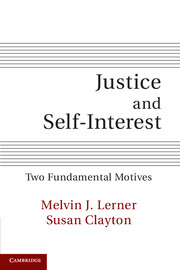Book contents
- Frontmatter
- Contents
- List of Figures and Tables
- Preface
- 1 Contesting the Primacy of Self-Interest
- 2 Why Does Justice Matter? The Development of a Personal Contract
- 3 Commitment to Justice: The Initial Primary Automatic Reaction
- 4 Explaining the Myth of Self-Interest
- 5 Defining the Justice Motive: Reintegrating Procedural and Distributive Justice
- 6 How People Assess Deservingness and Justice: The Role of Social Norms
- 7 Integrating Justice and Self-Interest: A Tentative Model
- 8 Maintaining the Commitment to Justice in a Complex World
- 9 Bringing It Closer to Home: Justice in Another “American Tragedy”
- 10 Emotional Aftereffects: Some Negative Consequences and Thoughts on How to Avoid Them
- References
- Author Index
- Subject Index
6 - How People Assess Deservingness and Justice: The Role of Social Norms
Published online by Cambridge University Press: 03 May 2011
- Frontmatter
- Contents
- List of Figures and Tables
- Preface
- 1 Contesting the Primacy of Self-Interest
- 2 Why Does Justice Matter? The Development of a Personal Contract
- 3 Commitment to Justice: The Initial Primary Automatic Reaction
- 4 Explaining the Myth of Self-Interest
- 5 Defining the Justice Motive: Reintegrating Procedural and Distributive Justice
- 6 How People Assess Deservingness and Justice: The Role of Social Norms
- 7 Integrating Justice and Self-Interest: A Tentative Model
- 8 Maintaining the Commitment to Justice in a Complex World
- 9 Bringing It Closer to Home: Justice in Another “American Tragedy”
- 10 Emotional Aftereffects: Some Negative Consequences and Thoughts on How to Avoid Them
- References
- Author Index
- Subject Index
Summary
The main function of presenting the evidence for the personal contract theory of justice imperatives and then critically examining the relevant self-interest literature was to set the stage for a theoretical model that attempts to describe how justice and self-interest appear in the normal course of people's lives and influence their reactions to critical events. Before embarking on that it is important to bring some clarity to the essentially important matter of how people assess who deserves what from whom. What rules and standards underlie or are revealed in their judgments of deservingness and justice?
Considerable research, as described in the preceding text, supports the hypothesis that people automatically seek out and respond to familiar cues that define who is entitled to what from whom as the primary and initial task in each encounter. The what in this context refers to forms of treatment and ways of interacting as well as to concrete and symbolic outcomes. As discussed in Chapter 5, interpersonal considerations and respect also represent resources that may be allocated (Clayton and Opotow, 2003). Unless and until modified by subsequent events, the automatically generated definition of the encounter provides the basis for what transpires. Having committed themselves to maintaining their personal contracts, people will naturally experience imperatives to comply with the preconsciously and consciously held rules that provide the structure and more or less specific guidelines for their daily activities. But what do we know of these rules?
- Type
- Chapter
- Information
- Justice and Self-InterestTwo Fundamental Motives, pp. 122 - 144Publisher: Cambridge University PressPrint publication year: 2011



